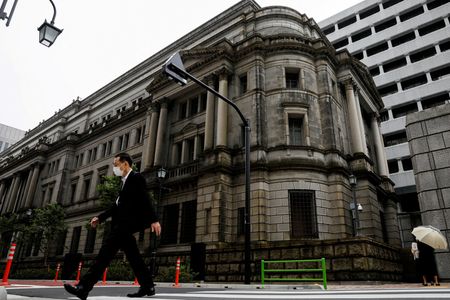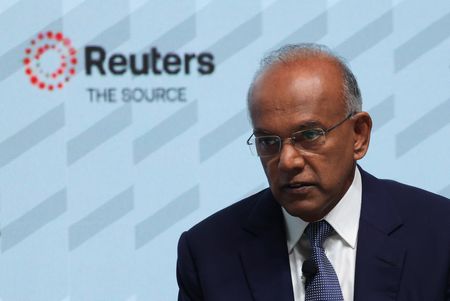By Tetsushi Kajimoto and Leika Kihara
TOKYO (Reuters) -Japan’s government on Tuesday announced nominees to replace two central bank policymakers who retire in July, appointments that will likely tilt the Bank of Japan (BOJ) board away from aggressive monetary easing policy.
The government chose Hajime Takata, an economist at brokerage Okasan Securities, to replace Goushi Kataoka, a vocal advocate of massive economic stimulus packages.
“He (Takata) is a centrist in terms of monetary policy,” said Hiroshi Ugai, a former BOJ official who is currently chief Japan economist at JPMorgan Securities.
“The choice suggests that under premier Fumio Kishida’s administration, the BOJ could shift away from reflationist-leaning monetary policy.”
A bond market expert, Takata wrote in a recent research note that the BOJ could come under pressure to consider how to exit ultra-loose monetary policy if the European Central Bank follows in the footsteps of the U.S.
Federal Reserve in withdrawing monetary stimulus.
The government also nominated Naoki Tamura, a senior adviser at Sumitomo Mitsui Banking Corp, as a new BOJ board member. Little is known on Tamura’s view on monetary policy, though analysts say he is unlikely to rock the boat in the near term.
Both nominees will join the BOJ when incumbents Kataoka and commercial banker Hitoshi Suzuki see their term end in July.
Kishida’s choice of the new BOJ board members has been closely watched by markets as offering clues on who he could choose as successor to Governor Haruhiko Kuroda, when his term ends early next year.
While the BOJ will likely be the last in line to raise interest rates due to low inflation, the shrinking presence of doves in the nine-member board could affect the pace at which it rolls back Kuroda’s legacy stimulus programme, analysts say.
Having warned of the cost of prolonged easing, Kishida is seen keeping a distance from predecessor Shinzo Abe’s policies that relied heavily on radical easing to stimulate growth.
“Today’s move is the first clear example of how Kishida’s personnel decisions are quite different from those of Abe’s,” said Mari Iwashita, chief market economist at Daiwa Securities.
In one of his reports, Takata said the BOJ risks losing control of long-term interest rates if external shocks trigger a sharp spike in bond yields.
The nominations will likely be approved by parliament given the ruling coalition’s solid majority in both houses.
(Reporting by Tetsushi Kajimoto, Kaori Kaneko, Yoshifumi Takemoto, Daniel Leussink, Kantaro Komiya, Takahiko Wada and Leika Kihara; Editing by Kim Coghill, Sam Holmes and Kenneth Maxwell)









